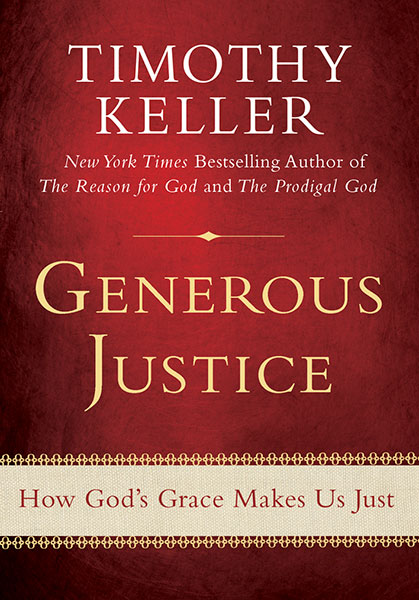Last week, I began interacting with Tim Keller’s Generous Justice by examining the introduction. As I noted, there are some strengths and weaknesses in the introductory chapter. The main weakness was Keller loose use of the term justice he offered at least four different uses of the word without further definition. Keller’s muddled thinking distorts Scripture’s use of justice. As we move to chapter one, we find some good things, like Keller’s clear concern for the poor, but the problems found in the introduction only deepen as he develops his argument.
As I read this chapter, I audibly vented my frustration on several occasions, interrupting my wife as she peacefully sipped her coffee. Thoroughly dealing with all the issues in this chapter would require a short book, but I will attempt to summarize them more quickly. These problems center on Keller’s attempt to redefine justice, which creates more issues than it solves. Despite the frustration I found in this chapter, one good thing comes from as Keller’s motive for redefining justice comes into focus—pursuing power. Below are the four major issues in the chapter.
A Blatant Contradiction
In the introduction, Keller correctly states that in the gospel God gives us grace and not justice, “I preached the classic message that God does not give us justice but saves us by free grace” (xxiii). This is a necessary distinction, but only a handful of pages later, Keller contradicts himself. He asserts Micah 6:8 defines justice as including the Hebrew word chesedh, which Keller defines as “God’s unconditional grace and compassion” (pg. 3). Don’t miss this important point. According to Keller, doing justice definitionally includes grace, but a couple of pages earlier he says grace isn’t justice, and justice isn’t grace. Is grace a part of justice, or is it something else? Keller can’t have it both ways. This not only a contradiction but by losing the distinction between justice and grace Keller undermines the basic categories of the gospel. Therefore, what is at stake in Keller’s redefinition of justice isn’t only issues of social justice, but the correct understanding of the gospel.
I’ve written more thoroughly on why Keller’s interpretation of Micah 6:8 is incorrect, and I encourage you to read it here. To summarize, the word chesedh isn’t about mercy/grace but is rather about covenant faithfulness. In the context Micah 6:8, this passage calls Israel to practice faithfulness to their covenant with God. This point is made clear as Micah cites Deuteronomy 10:12. To put it plainly, Micah 6:8 has nothing to do with redefining justice to include mercy, grace, or social justice. Keller also makes the same mistake with his treatment of Zechariah 7:9-10 (pg. 4). Keller’s interpretation of Micah 6:8 is at the heart of his redefinition, but it has no basis in the text. Keller’s thinking is confused at best and dangerous at worst.
Begging the Question
Throughout the chapter, Keller cites a plethora of texts to support his claim that God cares for the poor. All Christians should agree with this sentiment, but Keller uses these texts as justification for redefining justice. How? He believes God, to some extent, prefers the poor to the rich. His rapid-fire citations are meant to overwhelm us and drive us into submission to his view. Below are two texts he cites (emphasis mine):
This is what the LORD says: “Do what is just and right. Rescue from the hand of the oppressor the one who has been robbed. Do no wrong or violence to the immigrant, the fatherless, or the widow, and do not shed innocent blood in this place. – Jeremiah 22:3
If I have denied justice to my menservants and maidservants when they had a grievance against me, what will I do when God confronts me? – Job 31:13
Keller’s examples demonstrate that God calls us to give justice to the poor. Such behavior reflects God’s character, and no Christian should oppose this. However, that does not prove Keller’s redefinition is correct. These texts merely beg the question, “What is justice?” The context of each of these passages demonstrates that the traditional view of justice (giving someone his due/right) is in clearly in view. This is why all of these passages mention things like oppressors, being robbed, violence, being wronged, and grievances. These passages assume that justice has been violated or is about to be. There is no mention here, explicit or implicit, to charity or mercy being a part of justice. None of these passage call for redefining justice as they operate with the understanding that a wrong has been committed. Therefore, there are no grounds to redefine justice to include grace, mercy, or charity in these texts. In fact, they all support the traditional view.
Instead, poor people deserve justice like anyone else. Unfortunately, it is far easier to take advantage of the poor than the powerful. God warns mankind that if we think we can get away with wronging the poor, think again. God hates injustice against the poor (and the rich for that matter). Despite the impressive list of texts Keller cites, none of them support redefining justice, and thus, none of them support his argument. Instead, God commands us to do justice, which is giving everyone their due, whether they are rich or poor (Lev. 19:15; Deut. 1:16-17). Because God hates oppression, Christians must as well. While opposing oppression is fundamental to justice, it is not the same thing being merciful, charitable, or compassionate.
Social Justice versus Social Righteousness
Also, in this chapter, Keller argues for using the term social justice. He points to the Hebrew word tzadeqah. While Keller admits this word is usually translated as “being righteous” (pg. 10), he doesn’t let that slow him down. Despite its usual translation, Keller is adamant we should understand that when this word with the word for justice (mishpat), that we should translate it as social justice. He offers two of his own translations as examples:
The Lord loves social justice; and earth is full of his unfailing love. – Psalm 33:5
That he understands and know me, that I am the LORD, who exercises kindness and social justice on earth, for in these I delight. – Jeremiah 9:24
There are two problems with Keller’s argument. First, there is no reason in the Hebrew to collapse these two terms, righteousness and justice, into social justice. In both passages, the Hebrew includes the conjunctive translated as “and” symbolizing these two terms are in fact two terms and not one. Looking over the major English translations, all of them keep these two words as two separate terms. Second, there also isn’t a good reason in English to translate these two terms as social justice. The problem is, social justice has clear anti-Christian connotations. Instead, using the term social justice lumps Christians in with injustices like abortion, socialism, and the LGBTQ movement. So social justice doesn’t work well in either the Hebrew or in English.
So why is Keller determined to force the term social justice upon Christians? If he desires to stress the importance of charity and mercy, then isn’t social righteousness a better term since tzadeqah means righteousness? Why keep the term justice and get rid of the term righteousness, especially with the cultural baggage of social justice? Social righteousness has no such anti-Christian baggage, and it uses the core definition of tzadeqah. Social righteousness also conveys that living rightly before God involves loving your neighbor, which every true Christian affirms. It does all of this without redefining justice. Using the term social righteousness prevents the distortion of charity, mercy, and justice.
If Keller and other social justice advocates changed their terminology to social righteousness, then my concerns would be greatly reduced. I sense part of the hesitancy is righteousness is a more religious word which doesn’t appeal to outsiders. Righteousness humbles us all before the throne of God because there is no righteousness outside of him.
Social Justice is about Power
In the last portion of the chapter, Keller reveals his motivation for redefining justice:
They [other Christians] would insist that helping the needy through generous giving should be called mercy, compassion, or charity, not justice. In English, however, the word “charity” conveys a good but optional activity. Charity cannot be a requirement, for then it would not be charity. (pg. 15)
In this quote, Keller acknowledges many Christians desire to keep the traditional definition of justice, but he quickly brushes it aside. Why? Because then he can’t require charity from individuals. His quest to redefine justice is ultimately about power. Such a motivation fits well with larger the social justice movement outside of the church. Keller longs to make charity something individuals have a right to demand. He desires the authority to bind the consciences of people to his vision of charity.
Again, Keller’s thinking is out of step with Scripture. Righteousness is a requirement, but it is a requirement primarily before God and not man. Justice, while it is rooted in God and ultimately executed by God, functions more horizontally. Justice places demands between individuals. In other words, we can rightly demand justice from one another and human institutions.
Conversely, righteousness is primarily our standing as individuals before God and others. Keller aims to bind people’s consciences on a horizontal level by turning charity into an issue of justice. To do this, you must redefine justice. Is this not what we see throughout the social justice movement? If you disagree with them, then you are anathematized for not being woke enough.
It is the pursuit of power which prevents social justice warriors from embracing the term social righteousness because righteousness relies more on changed hearts than justice does. Executing justice requires giving someone what is their right. There is no heart change required for justice because the government executes it through its coercive power. Righteousness is entirely different. Righteous living only comes after God has declared us righteous by grace through faith. It is only after hearts of stone are changed that righteousness takes root. Changed hearts slowly bear the fruit of righteous living.
The heart of the problem is Keller desires to bind things that only God has the authority to bind. God can and does require righteousness. God requires charity and mercy of his people, and God provides the means for them to do this through regeneration. Keller isn’t satisfied with this, so he demands charity and mercy on a horizontal and ultimately coercive level. Redefining justice is about the power to bind the consciences of everyone. Is it any wonder social justice warriors turn to the coercive power of the state to further their agenda? If charity to the poor is justice, then the government has every right to enforce it. But if charity is an issue of righteousness, then it is left to God and to his church to call people to love their neighbors.
This chapter has many problems, but it clarifies Keller’s motivation. Ultimately, it is his confusion of justice and righteousness, which leads him to distort both. Many of the problems with social justice are rooted in man trying to take what only belongs to God. Man cannot force others to grow in righteousness. Instead, righteousness only comes through the free grace of the gospel. I fear Keller’s desire is rooted in impatience. If he is correct about social justice, then the government has every right to enforce it. The danger is evident—the state makes a terrible god. When the state usurps God’s authority, justice does not advance. Rather, evil and injustice only increase. Consequently, the pursuit of social justice invariably leads to injustice.
Levi J. Secord






